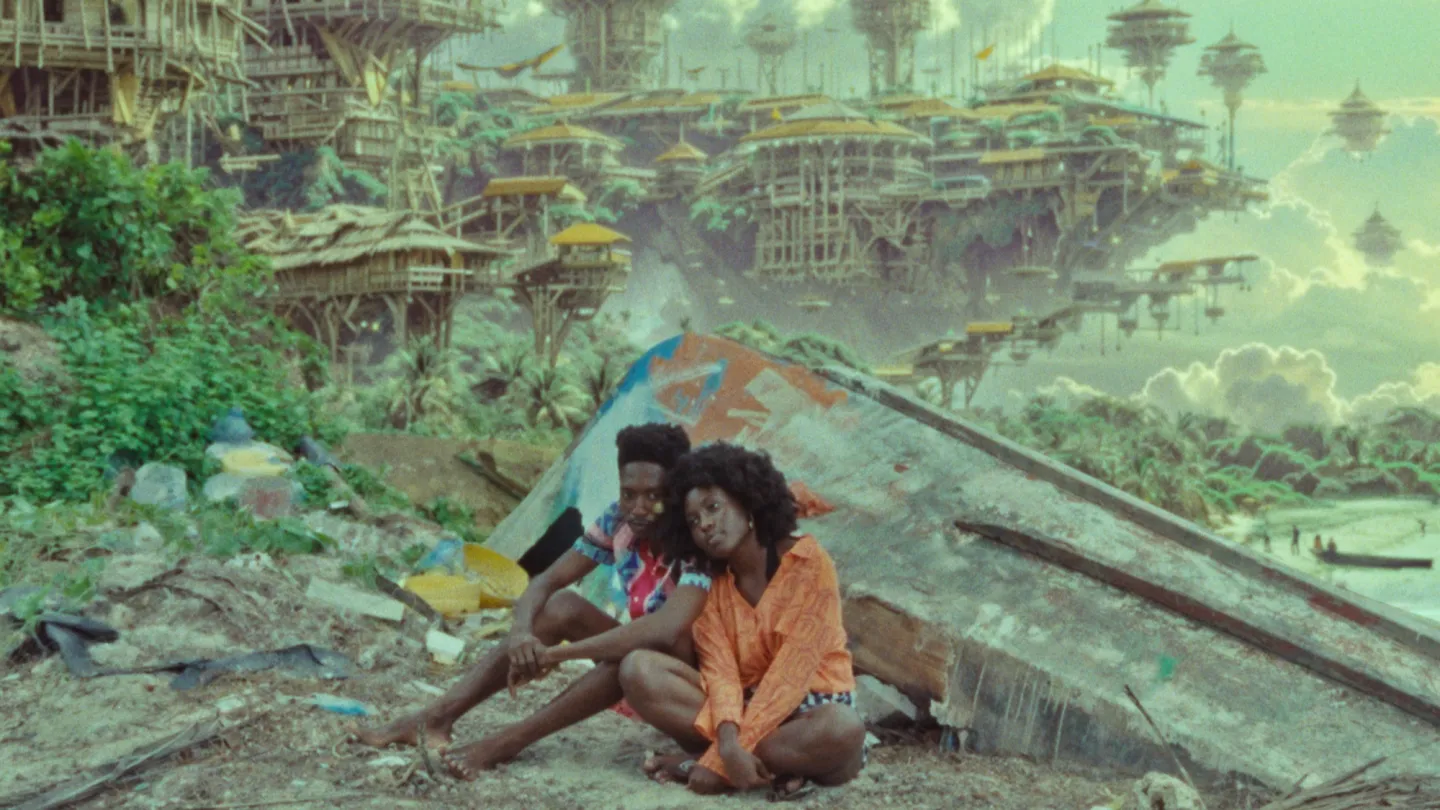Memory of Princess Mumbi
Memory of Princess Mumbi
VERDICT: Shot in Kenya, Damien Hauser's wildly inventive retro-futuristic fairy tale combines dazzling AI visuals with bittersweet meditations on love and loss, cinematic fantasy and human reality.
While the global movie industry is currently wracked with anxiety about the dawning AI revolution, young Swiss-Kenyan film-maker Damien Hauser has almost single-handedly crafted a hugely impressive micro-budget sci-fi adventure which serves as both eye-popping showcase and measured critique of this ominous new technology. Mixing romantic adventure fable, hybrid documentary and meta-fictional mockumentary elements, lightly spiced with self-referential snippets of Film Theory, Memory of Princess Mumbi is a thrilling pointer to the future that draws deeply on past cinematic tradition. It is also a personal act of grieving for Hauser, which only becomes clear at the end.
Hauser’s fourth feature has some of the gaucheness we might expect from a 24-year-old one-man film crew with scant resources and limited experience. There are plot holes, ragged edges and stilted performances here. But they scarcely matter when the end result is so formally inventive, tearing up cinematic conventions, keeping us on our toes with a feast of images and ideas. This week, Memory of Princess Mumbi becomes the first Kenyan production ever to world premiere in the Venice Days sidebar, with a North American debut to follow soon in Toronto. If Hauser can sustain this level of creative dynamism, he is clearly a serious talent to watch.
Memory of Princess Mumbi crams a lot of plots, subplots and textural layers into its post-modern patchwork narrative, including passages of improvised dialogue, plus Hauser even playing an off-screen version of himself in the early scenes. But at its core lies an old-fashioned fairy-tale romance between star-crossed lovers. The setting is the African coastal state of Umata at the end of the 21st century, two decades after a global war in which traditionalist forces triumphed, promptly banning the digital technology that was allegedly causing widespread depression. Africa has since reverted to a continent of ancient empires run by despotic monarchs. Why this has happened is not entirely clear, but it makes for some great world-building visuals.
A cocky young film-maker from Europe, Kuve (Ibrahim Joseph) is in Umata trying to make a documentary which proves the citizens are still depressed, despite the new political climate. He recruits a local actress, the spirited Mumbi (a luminous Shandra Apondi), to help present his film. Even though Mumbi challenges Kuve’s simplistic, subjective narrative, a romance sparks between them. But Mumbi’s hand in marriage has already been promised to Prince Prince (Samson Waithaka), the powerful ruler of a neighbouring kingdom. After briefly going on the run in Europe, she resigns herself to her royal destiny, leaving Kuve heartbroken. When their paths next cross, six years later, he is a famous film-maker and she a princess. But their old chemistry still sizzles, leading to tension and tragedy on the set of Kuve’s latest blockbuster.
On a purely visual level, Memory of Princess Mumbi looks consistently stunning, cramming blockbuster-level production design into an 80-minute low-budget feature. Hauser uses AI software extensively here but also more antique methods like rotoscoping, compositing and green screen. Blending real Kenyan locations with digital effects, the cityscapes and coastal villages are particularly strong, gravity-defying mega-structures that combine old, new and future elements into dazzling fantasy architecture. We are not in Wakanda any more, Toto.
Hauser has fun with smaller design elements too, including the grammar of cinema itself, pre-magining fictional future blockbusters complete with accompanying awards ceremonies, posters and publicity materials. The meticulous level of detail, colour and symmetry here frequently recalls Wes Anderson at his most playful.
For all its bouncy pace and glossy surface sheen, Memory of Princess Mumbi has serious points to make about the post-colonial cinematic gaze, unreliable narrators, human creativity vs digital simulation, and more. As a mixed-heritage film-maker from Switzerland, Hauser is particularly wary of cliched Eurocentric takes on Africa. Indeed, he rejects his film being labelled “Afrofuturism”, arguing this term was imposed on the continent by outsiders.
In a nicely ironic counterpoint to his extensive use of AI effects, Hauser stages a recurring debate between his main protagonists about the ethics of deploying this technology in film-making. Mumbi takes a firm line, chastising Kuve for using AI to make interviewees look more depressed, purely to suit his subjective narrative, and for handing over his creative decision-making to autonomous editing software. Hauser’s messaging is ambivalent here, because AI is new and its long-term effects unclear, but it is refreshing to see a young film-maker weighing up its pros and cons, challenges and contradictions in such a creative way.
On a deeper thematic level, Memory of Princess Mumbi is also an act of personal catharsis for Hauser, a memorial of sorts for his 14-year-old brother Charles, who died in a motorcycle accident before this project was born. The director headed to Kenya to recuperate, where his meditations on how we choose to remember lost loved ones began to percolate into an embryonic screenplay about bereavement and depression, joy and celebration. This delirious fever-dream of a film ends with a dedication to Charles.
Director, screenwriter, cinematography, editing, music, producer, production design: Damien Hauser
Cast: Shandra Apondi, Ibrahim Joseph, Samson Waithaka, Michael Garama, Damien Hauser
Sound: Nikola Medic
Co-producers: Kaleem Aftab, Shandra Apondi
Production companies: Out of My Mind Films (Kenya), Hauserfilm (Switzerland)
World sales: Paradise City, Paris
Venue: Venice Film Festival (Venice Days)
In English
80 minutes

